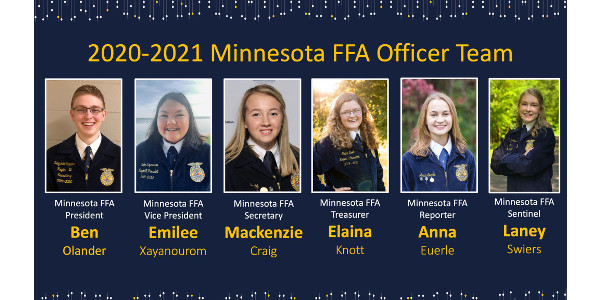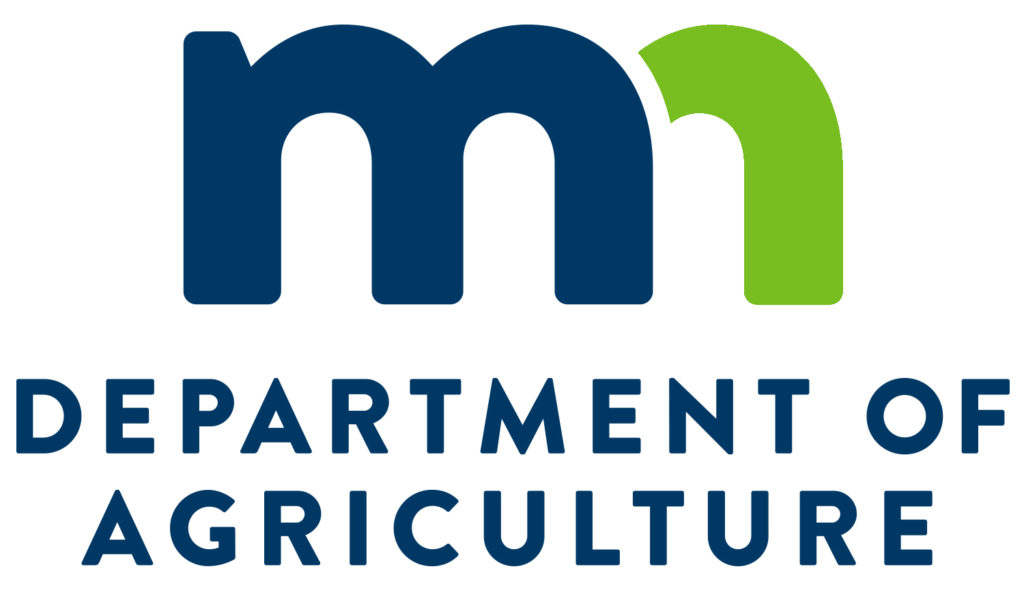
a large number of students wearing blue jackets from all over the state.
(Photo from KEYC.com)
The Minnesota state FFA Association’s convention is a culminating event for thousands of FFA members, agricultural education teachers, and supporters each spring. The virtual convention was filled with moments of celebrating student and chapter successes, gaining education and leadership experiences, and thanking partners and supporters.
“The goals of our convention never changed; the delivery changed,” said Lavyne Rada, Minnesota state FFA regional director. “We are proud to have celebrated the accomplishments of our students and teachers this year.”
The association’s 91st convention highlighted the importance of agriculture education across nearly 200 Minnesota schools where 270 teachers provide students with classroom instruction surrounding agriculture, food, and natural resources. Those courses allow these same students to take on work-based learning projects known as Supervised Agricultural Experience (SAE) projects as research, entrepreneurial or placement efforts and earn awards and degrees through membership in FFA. FFA and SAE are integral components of school-based agricultural education.

“When it became clear our convention would be virtual this year, our team of state officers and leaders rose to the challenge,” said Juleah Tolosky, Minnesota FFA executive director. “The result surpassed our expectations both from a participation perspective and from the way the convention components came together.”Tolosky said the success of FFA’s leadership component was very clear during the adjustments made by student leaders to adjust convention activities due to COVID-19.
“I can not say enough about the six individuals on our Minnesota state FFA State Officer team and the maturity with which they accepted their disappointment in not celebrating their year in person, and the creativity they brought to bear in designing the virtual event,” said Tolosky.
Educational Experiences
Forty interactive virtual workshops, panels, and tours provided more than 500 students and 100 supporters an opportunity to engage as they learned about agriculture, leadership, college and careers. Opportunities were further expanded through viewership of online award ceremonies and keynotes highlighting the achievements of the Minnesota FFA’s top members.
Agricultural education is a foundational component of FFA. That is why the convention also included recognition of 24 high school seniors who plan to pursue agricultural education at colleges next fall, with the intent to enter the classroom. These students were part of a workshop called “Tagged to Teach Ag.” A signing event identifying the students and featuring Minnesota Education Commissioner Mary Cathryn Ricker can be viewed on YouTube.
“Those commitments are key to the future education of students,” said Paul Aarsvold, president of the Minnesota Association of Agriculture Educators (MAAE) and an agriculture teacher/FFA advisor at Plainview-Elgin-Millville.
“Demand for these teachers is higher than what we have been able to fulfill in the past few years,” said Aarsvold. “The wide area of subjects taught in agricultural education makes this curriculum highly valuable to future success in the workforce.”The FFA State Convention was supported by contributions from more than 100 companies, organizations and individuals who invest in the future through agricultural education. Those funds, made through the Minnesota FFA Foundation, assist with award programs as well as operations related to putting on the event. The virtual Minnesota FFA Convention is archived on YouTube.com/MinnesotaFFA, on mnffa.org and on the Minnesota FFA Association social media platforms.
About Minnesota FFA
FFA is a national organization developing students’ potential for premier leadership, personal growth and career success through agricultural education with more than 700,000 members in all 50 states, Puerto Rico, and the U.S. Virgin Islands. The Minnesota FFA Association represents nearly 11,000 members and 200 high school chapters across the state. Agricultural education engages students through hands-on learning in the classroom, work-based learning opportunities known as Supervised Agricultural Experience (SAE) projects, and FFA activities.
You can learn more about the experiences of FFA members and supporters by visitingwww.mnffa.org andwww.ffa.org.

